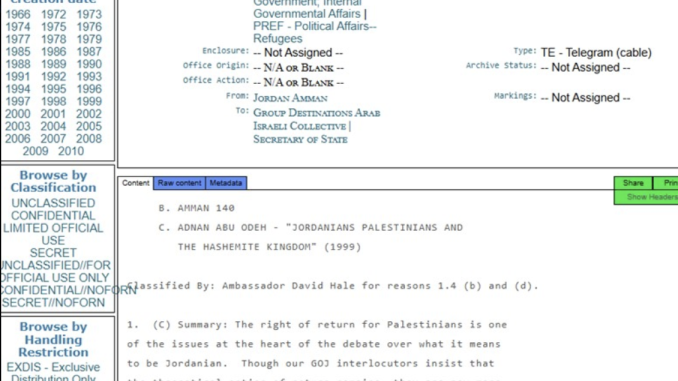Mudar Zahran Tweeted the Following:
[Click Photo for Enlargement]
PRESIDENT TRUMP CALLING FOR THE SETTLEMENT OF PALESTINIAN REFUGEES IN JORDAN, JORDAN’S PALESTINIAN MAJORITY SEEMS TO LARGELY AGREE…
HERE’S A SECRET CABLE BY THE US EMBASSY IN JORDAN:
JORDANIANS OF PALESTINIAN ORIGIN ARE LARGELY UNCONCERNED WITH THE RIGHT OF RETURN. INSTEAD, THEY FAVOR A RESOLUTION THAT ENSURES THEIR COMPENSATION AS WELL AS GUARANTEES OF THEIR LEGAL AND POLITICAL RIGHTS IN JORDAN
Source: https://wikileaks.org/plusd/cables/08AMMAN391_a.html
“A common theme that emerges from discussions with Palestinian-origin contacts and some government officials (although not necessarily East Bankers as a group) is a “grand bargain” whereby Palestinians give up their aspirations to return in exchange for integration into Jordan’s political system.”
“Jordanians of Palestinian origin (and many, but not all, of the East Bankers we speak to) assume that an end to the question of the right of return will lead to equal treatment and full political inclusion within Jordan.”
“For their part, many Palestinian-origin Jordanians are less concerned with “prejudging” the right of return, and more concerned with fulfilling their roles as Jordanian citizens who are eligible for the full range of political and social rights guaranteed by law.”
“For Jordanians of Palestinian origin, the right of return is either an empty (if cherished) slogan or a legitimate aspiration. For East Bankers, the right of return is often held up as the panacea which will recreate Jordan’s bedouin or Hashemite identity. The issue is inextricably linked with governmental and societal discrimination toward the Palestinian-origin community”, “We consider ourselves realists” says Bisher Khasawneh, (later become Jordan’s Prime Minister) “The modalities won’t allow for the right of return.” Current NCB Director Nawaf Tal acknowledges that while Jordan “cannot be frank about the right of return,” it has essentially dropped the concept of a “right” of return from its negotiating position. Officials now emphasize the right of Palestinians to choose whether or not to return, with the apparent assumption that many will not exercise that right.
” When it comes to thinking about the right of return, Palestinians in Jordan fall into roughly two camps. In the first are those who align themselves with the government approach, keeping up the rhetoric for the sake of appearances, but behind closed doors quickly abandoning return as a political and logistical impossibility. This group is more concerned about personal compensation (and doubts that Jordan would ever have the chutzpah to ask for “structural” compensation).”
“In the second camp are those who cling to the principle. For the most part, this latter view is probably most prevalent among refugee camp residents who hope to be plucked out of landless poverty by a peace agreement and the compensation that may come with it.”
“In conversations with us, many Palestinian-origin Jordanians readily acknowledge that the right of return is merely a fantasy. “It’s not practical,” says political activist Jemal Refai. “I’m not going to ask Israel to commit suicide.”
Refai hypothesizes that government pressure, not genuine feeling, produces doctrinaire statements on the right of return among Jordanian Palestinians. He insists that the General Intelligence Department (GID) and the government foster an atmosphere in which anything other than a solid endorsement of the right of return is met with official scorn, and thinks that the debate would shift if this atmosphere was changed.”
“East Bankers They hope for a solution that will validate their current control of Jordan’s government and military, and allow for an expansion into the realm of business, which is currently dominated by Palestinians.
In fact, many of our East Banker contacts do seem more excited about the return (read: departure) of Palestinian refugees than the Palestinians themselves.”
“NGO activist Sa’eda Kilani predicts that even (or especially) after a final settlement is reached, Palestinians will choose to abandon a Palestinian state in favor of a more stable Jordan where the issue of political equality has been resolved. In other words, rather than seeing significant numbers return to a Palestinian homeland, Jordan will end up dealing with a net increase in its Palestinian population.”
“The right of return in Jordan is inextricably linked with the problem of semi-official discrimination toward the Palestinian-origin community.”
“Just because there is a logic to trading the right of return for political rights in Jordan does not mean that such a strategy is realistic, and it certainly will not be automatic. There are larger, regime-level questions that would have to be answered before Palestinian-origin Jordanians could be truly accepted and integrated into Jordanian society and government.”
“Palestinian National Council Member Isa Al-Shuaibi reported to the Embassy “The concept of returning as a right which is guaranteed by UN resolutions and Arab solidarity will be difficult to change in the event of a comprehensive settlement. He posits that in the end,
Palestinians who hold orthodox positions on the right of return are the same people who are unlikely to accept any peace agreement, no matter how generous. He thus sees little need to prepare the ground for a shift in tactics, as “reasonable” Palestinians have already recognized that that abandoning this particular demand is inevitable.”




Leave a Reply
You must be logged in to post a comment.